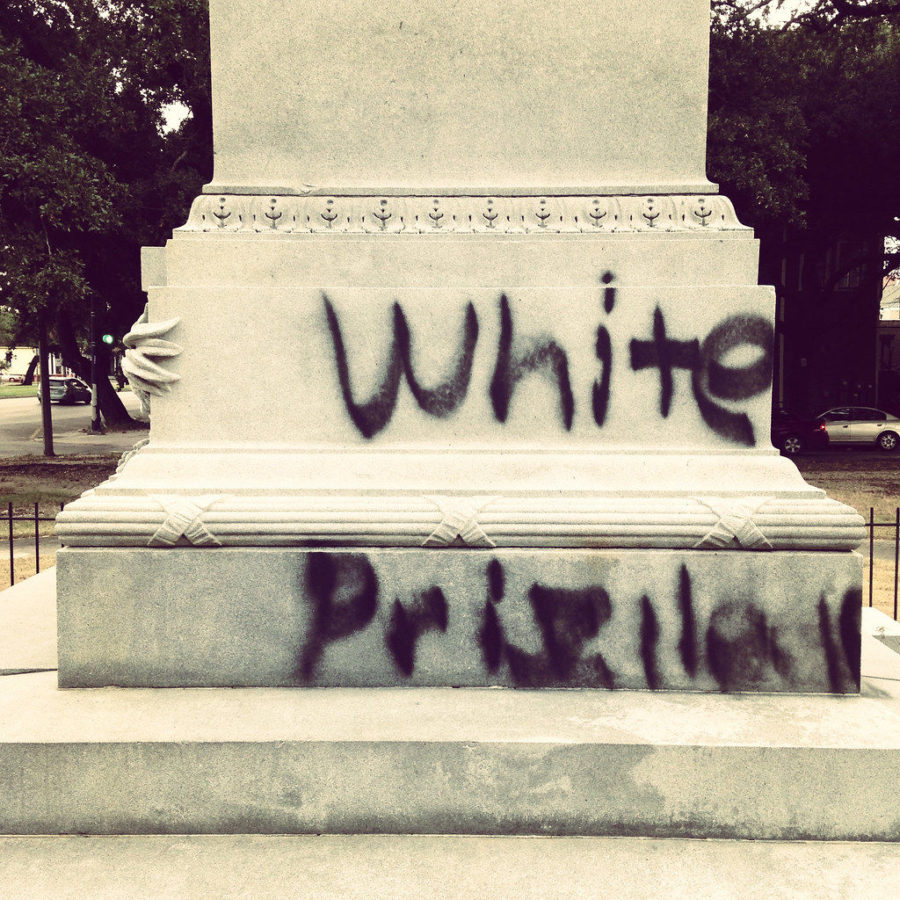Rasmussen: Addressing the elephant in the room: white privilege
Columnist Olivia Rasmussen believes racism is still a prevalent issue today and sheds light on what privilege means in the wake of the death of Ahmaud Arbery.
May 12, 2020
Media has been circling around the story of Ahmaud Arbery, an unarmed black man in Georgia who was jogging and hunted down by two armed white men, Gregory McMichael and Travis McMichael, who claim they were making a “citizen’s arrest” by shooting Arbery in cold blood. It took 74 days before the killers were prosecuted and jailed. This is not the first of its kind and, tragically, it won’t be the last.
During the past month, armed white men and women have been storming state capitols without any consequences and surely no deaths. What’s the difference?
The color of their skin.
Let’s break down white privilege. I’ll start with what it doesn’t mean: it doesn’t mean white people haven’t struggled, whether it be emotionally, financially or physically. It doesn’t mean white people don’t experience pain and fear. It doesn’t mean all white people are personally racist. It doesn’t mean people haven’t been mean or unfair to white people. It means none of those hardships and struggles have come from the color of their skin and that alone.
It means white people can jog through any neighborhood without being shot and killed. It means white people can go to the park with their family and enjoy a picnic without someone calling the cops on them for being white. It means white people can walk past someone on the street without them clutching their belongings like they’re going to be robbed. It means white people can protest with their assault rifles and scream in the face of cops without losing their life. It means the American justice system doesn’t inherently work against white people.
It means white people don’t have to face the crippling historical and systemic racism instilled in our nation.
Of course, the systemic racism doesn’t fall solely on the shoulders of one white person, but it collectively is the responsibility of non-people of color to accept their privilege and work to undo the centuries worth of discrimination, prejudice and racism. It’s not the job of people of color to explain white privilege. It’s not the job of people of color to tell white people how to proceed when a tragedy like this occurs. People of color shouldn’t have to explain how their skin color has consistently put them at a disadvantage. And they should not have to explain why they deserve equity and justice.
Before you try to compare and contrast successful people of color, realize that this doesn’t mean people of color aren’t successful or can’t achieve success. This doesn’t mean people of color can’t experience happiness and a sense of normalcy. This doesn’t mean struggles don’t go beyond race. This means, again, that American values and systems are rooted in a deep racism that are still very blatant issues today.
Let’s look at it again — it took 74 days before the killers were arrested. Even though there is a video (graphic warning) of Arbery being hunted and killed, “Due to conflicts of interest, the case is now on its third prosecutor, who said he will ask a grand jury to bring charges,” per CBS News. Lee Merritt, the attorney for Arbery’s family, “said he believes there have not been any indictments because Gregory McMichael is a former investigator for the Brunswick district attorney’s office,” in a different interview with CBS News.
Arbery’s death is a ruthless reminder of how far we still have to go as a nation. Our justice system is deeply flawed along with our values. Where are the pro-Trump shelter-in-place protestors with their signs that exclaim “my body, my choice!” and how their rights are under attack? What about the rights of black Americans? What about the choice Arbery made to take a jog that day, only to be a victim of a lynching by two white supremacists?
We, as white people, need to accept our privilege and do better. Again, this shouldn’t be turned into a “not all white people…” rant. This is about systemic racism and how innocent lives of black and brown people are being stripped away at the hands of racism.







